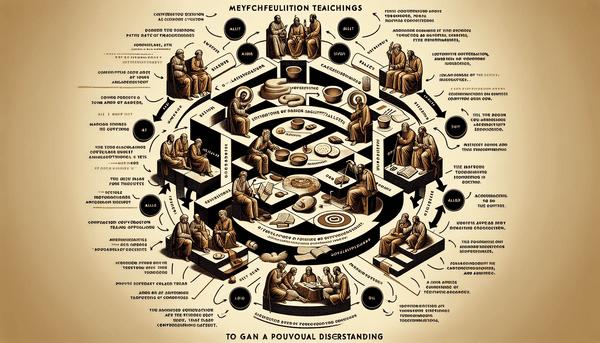Christian Response to LGBTQ+ Community Members
In grappling with the intersection of faith and LGBTQ+ identities, it is crucial to underscore the Biblical mandate to love and show compassion. Jesus taught us to 'love your neighbor as yourself' (Matthew 22:39), a command that calls us to embrace all individuals, including LGBTQ+ Christians, with empathy and grace. The Bible reminds us that we are not to judge others, for 'judgment is without mercy to one who has shown no mercy. Mercy triumphs over judgment' (James 4:12). Furthermore, the sacred belief that all people are made in the image of God (Genesis 1:27) underpins the inherent dignity and worth of every individual, irrespective of sexual orientation or gender identity.
The church's role extends to offering support, understanding, and an environment where open and honest dialogue is encouraged (Galatians 6:2). As we engage with one another in conversations and prayer, seeking wisdom (James 1:5), we build a community that allows each person to explore their faith journey within the safety of God's love. It is not our place to prescribe the path for others but to walk alongside them, respecting their individual journeys (Philippians 2:12) and trusting that they, too, are seeking God’s guidance (Proverbs 3:5-6). Striking a balance between upholding Biblical teachings and exercising compassion is paramount (Ephesians 4:15).
Reflections on Psalm 90
Psalm 90 presents a poignant meditation on the transient nature of human life contrasted with the eternal nature of God. The psalmist acknowledges, 'Before the mountains were brought forth, or ever you had formed the earth and the world, from everlasting to everlasting you are God' (Psalm 90:2), reminding us of the enduring constancy of the Divine. This is juxtaposed with the fleeting existence of humanity, where 'The days of our lives are seventy years; and if by reason of strength they are eighty years' (Psalm 90:10), prompting us to consider the brevity of our time on earth.
Recognizing this, we are urged to 'So teach us to number our days that we may get a heart of wisdom' (Psalm 90:12). Such wisdom leads us to steward our time and lives in ways that honor God (Colossians 3:17) and make a positive impact on those around us (Ephesians 5:15-16). In the face of life's uncertainties, the psalmist finds solace in God's steadfast love and reassures us of God's faithfulness (Lamentations 3:22-23), inviting us to embrace each new day with purpose and gratitude (Psalm 90:17; 2 Thessalonians 3:3).
The Parable of the Prodigal Son
The Parable of the Prodigal Son unfolds as a narrative rich with themes of forgiveness, redemption, and the boundless love of God. We witness a father's joy at the return of his lost son, which mirrors the divine joy over one sinner who repents (Luke 15:20-24). This parable invites us to reflect on God's readiness to forgive and the transformative power of receiving and extending forgiveness (Psalm 32:1). It encourages us to embrace new beginnings and the renewal of our own lives (2 Corinthians 5:17).
Moreover, the parable illuminates the depth of God's unconditional love, which welcomes us back with open arms, regardless of our past failings (1 John 3:1; Luke 15:32). The father's response in the story serves as a model for us, exemplifying the grace and compassion we are called to show one another (Ephesians 2:4-5). As we apply the lessons of this parable to our lives, we are prompted to seek forgiveness in our relationships (Colossians 3:13), and to cultivate a spirit that is merciful, just, and humble (Micah 6:8).
Conclusion
As we have explored these Biblical passages and parables, we are reminded of the transformative potential they hold for our personal and communal lives. The teachings of Jesus, the reflections of the psalmists, and the stories told in parables provide us with a framework for living that is rooted in love, wisdom, and compassion. Integrating these principles into our interactions and choices contributes to the creation of a world that reflects the heart of the Gospel—a world of acceptance, understanding, and boundless love. For those seeking to further this journey by finding a spiritual home, the process is deeply personal and essential. May we each find inspiration in these timeless lessons and strive to embody them in our daily lives.
FAQ
Q: What happens if a Christian becomes part of the LGBTQ+ community?
A: If a Christian becomes part of the LGBTQ+ community, it is important for the church to respond with love, support, and understanding. This may be a time for open and honest conversations, as well as prayer and seeking God's guidance. Ultimately, it is between the individual and God to discern their path, and it is our role to show them love and understanding, and to continue to walk alongside them in their faith journey.
Q: What is the meaning of Psalm 90?
A: Psalm 90 invites us to reflect on the contrast between the eternal nature of God and the brevity of human life. It encourages us to consider the significance of our days and the importance of living with wisdom and intentionality. The psalmist prays for God's wisdom in recognizing the transient nature of life and the need to make each day count. This challenges us to consider how we steward our time and resources, and to live in a manner that honors God and contributes positively to the world around us.
Q: How do the themes of time, wisdom, and God's faithfulness in Psalm 90 resonate with you?
A: The themes of time, wisdom, and God's faithfulness in Psalm 90 resonate by prompting us to examine our own lives and consider how we approach the passage of time, the choices we make, and our relationship with God. It is a reminder to live intentionally and with a sense of purpose, acknowledging God's enduring love and seeking His guidance in all we do.
Q: What lessons can we learn from the Parable of the Prodigal Son?
A: The Parable of the Prodigal Son offers profound lessons about forgiveness, redemption, and the unconditional love of God. It prompts us to reflect on the importance of forgiveness in our own lives, both in seeking forgiveness from others and extending forgiveness to those who have wronged us. It also encourages us to consider the depth of God's mercy and the joy that comes from reconciliation and restored relationships.






